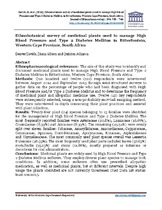Ethnobotanical survey of medicinal plants used to manage High Blood Pressure and Type 2 Diabetes Mellitus in Bitterfontein, Western Cape Province, South Africa
Abstract
ETHNOPHARMACOLOGICAL RELEVANCE: The aim of this study was to identify and document medicinal plants used to manage High Blood Pressure and Type 2 Diabetes Mellitus in Bitterfontein, Western Cape Province, South Africa.
METHODS: One hundred and twelve (112) respondents were interviewed between August 2014 and September 2015 through semi-structured surveys to gather data on the percentage of people who had been diagnosed with High Blood Pressure and/or Type 2 Diabetes Mellitus and to determine the frequency of medicinal plant and allopathic medicine use. Twelve (12) key respondents were subsequently selected, using a non-probability snowball sampling method. They were interviewed in-depth concerning their plant practices and assisted with plant collection.
RESULTS: Twenty-four plant (24) species belonging to 15 families were identified for the management of High Blood Pressure and Type 2 Diabetes Mellitus. The most frequently reported families were Asteraceae (20.8%), Lamiaceae (16.67%), Crassulaceae (8.33%) and Aizoaceae (8.33%). The remaining (45.54%) were evenly split over eleven families- Fabaceae, Amaryllidaceae, Anacardiaceae, Capparaceae, Geraniaceae, Apiaceae, Convolvulaceae, Apocynaceae, Rutaceae, Asphodelaceae and Thymelaeaceae. The most commonly used plant species overall was Lessertia frutescens (96.55%). The most frequently used plant parts included leaves (57.63%) roots/bulbs (15.25%) and stems (11.86%), mostly prepared as infusions or decoctions for oral administration.
CONCLUSIONS: Medicinal plants are widely used by High Blood Pressure and Type 2 Diabetes Mellitus sufferers. They employ diverse plant species to manage both conditions. In addition, some sufferers often use prescribed allopathic medication, as well as medicinal plants, but at different intervals. Despite high usage the plants identified are not currently threatened (Red Data list status: least concern).

